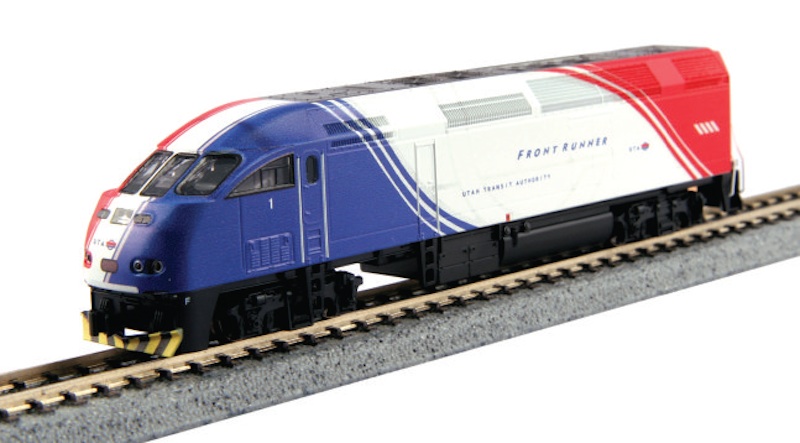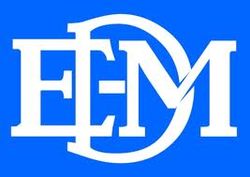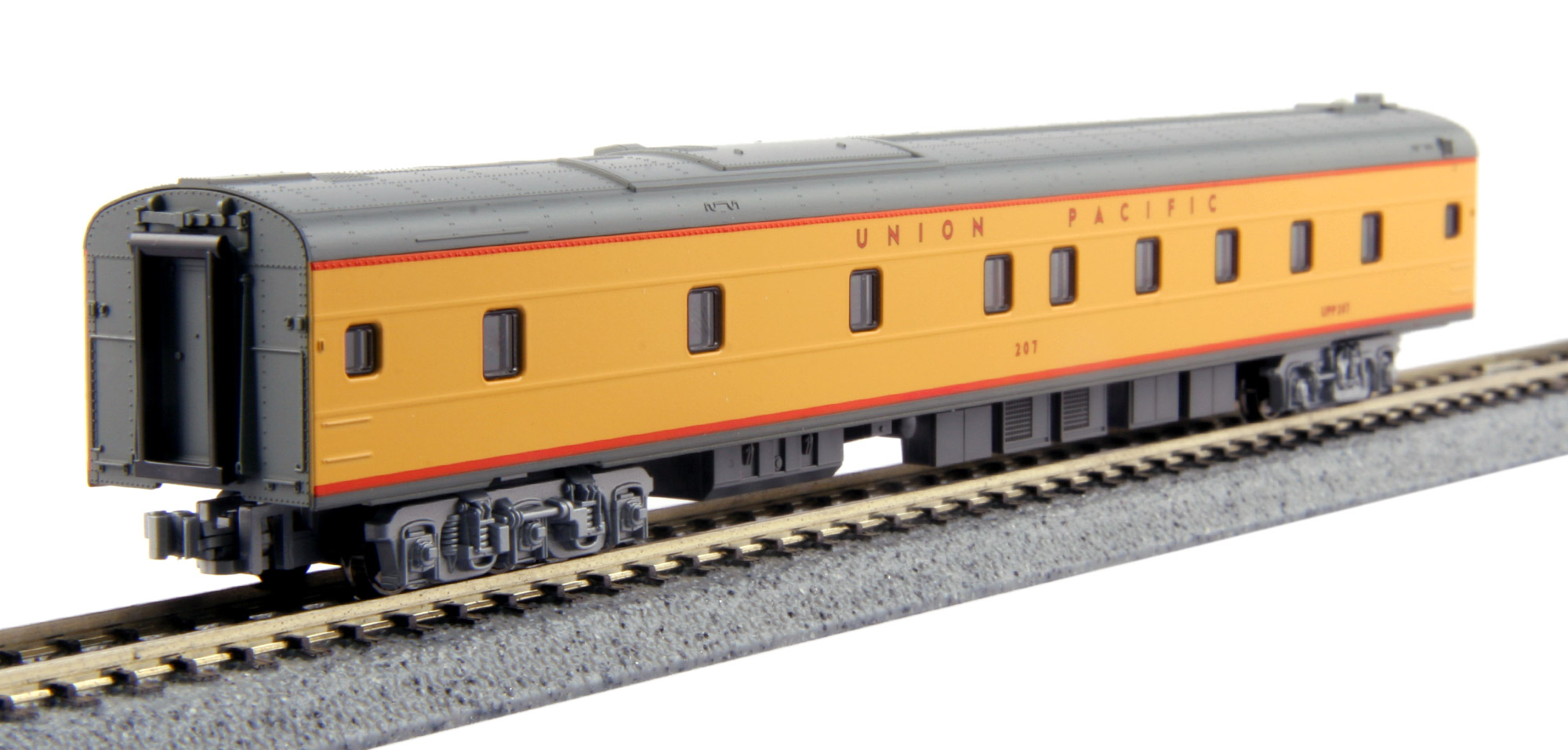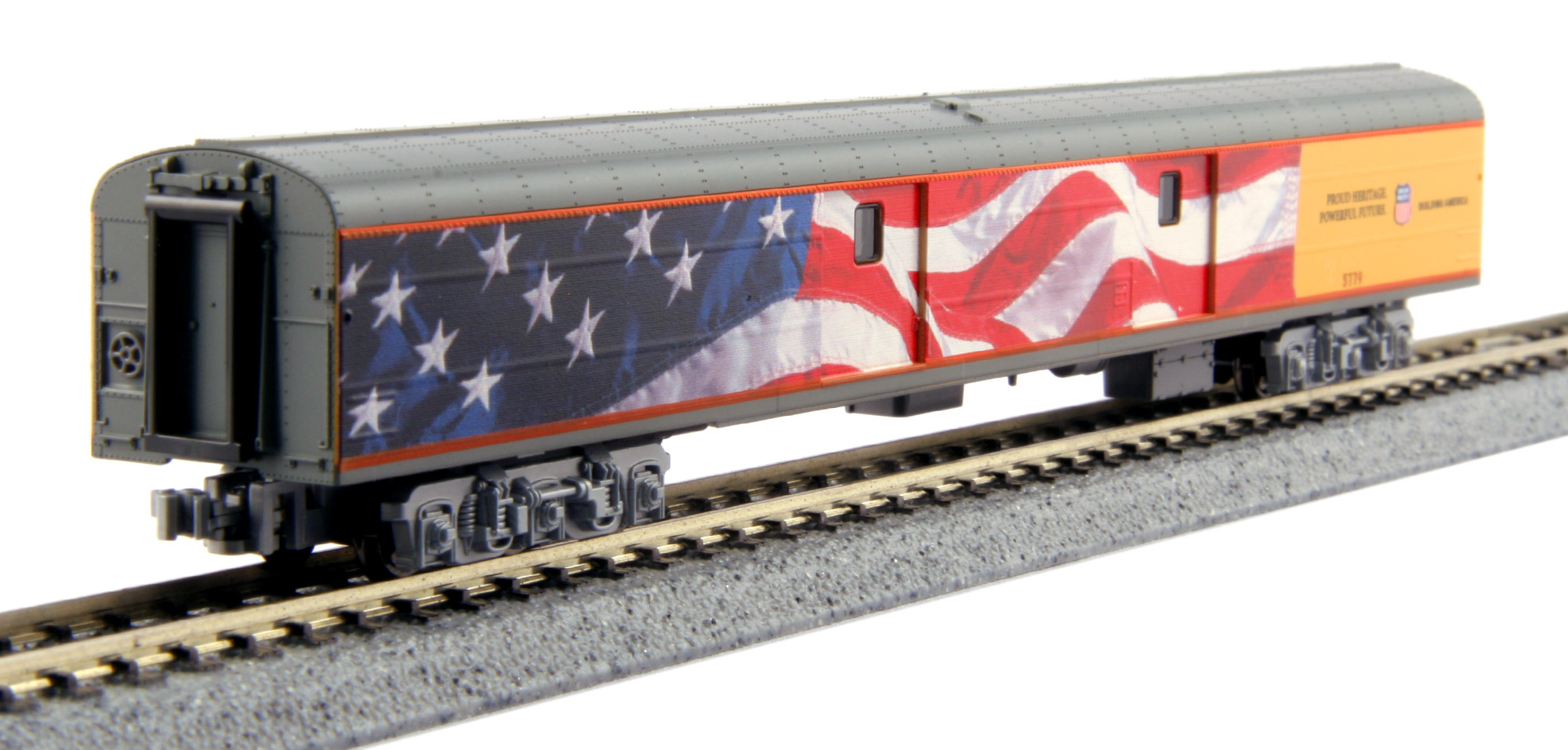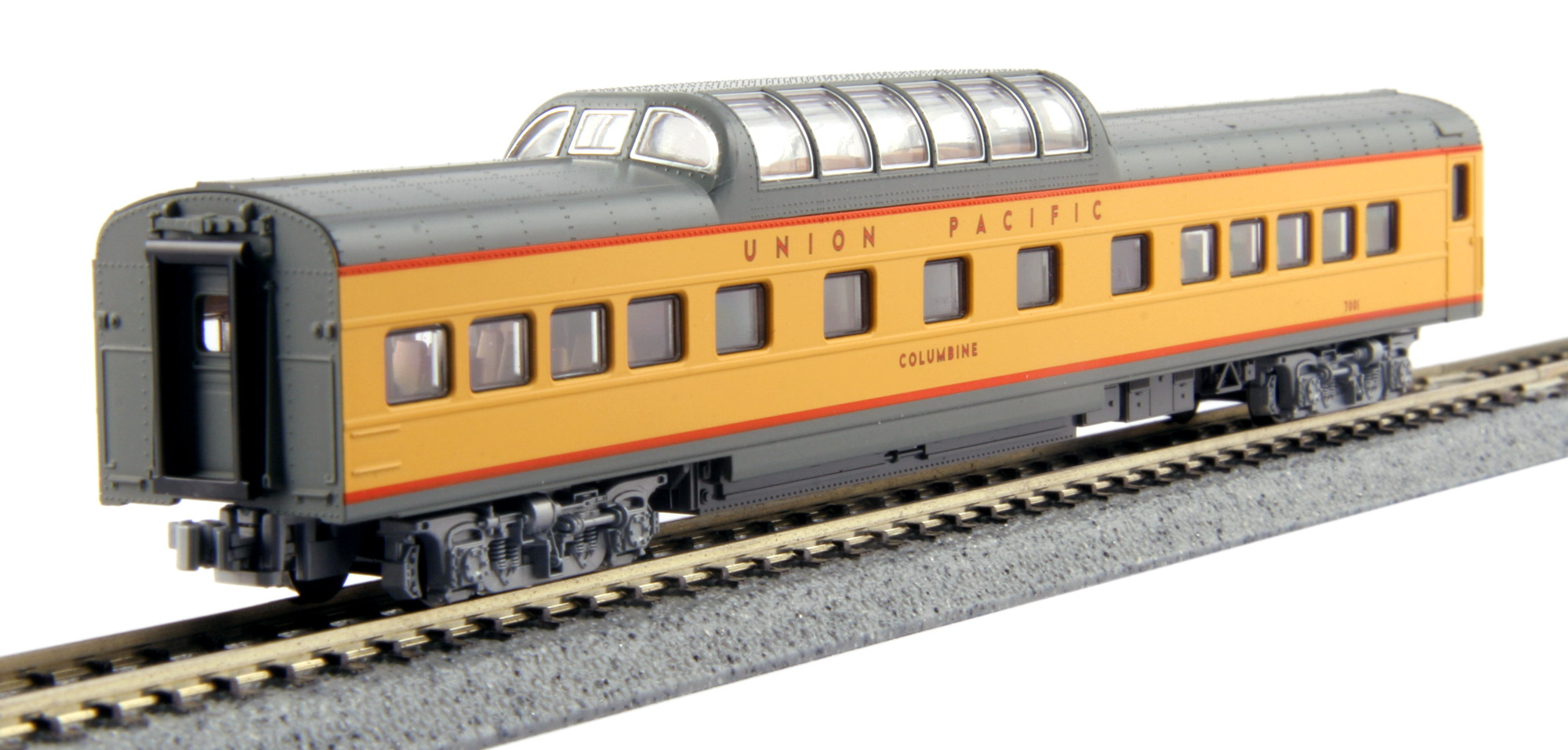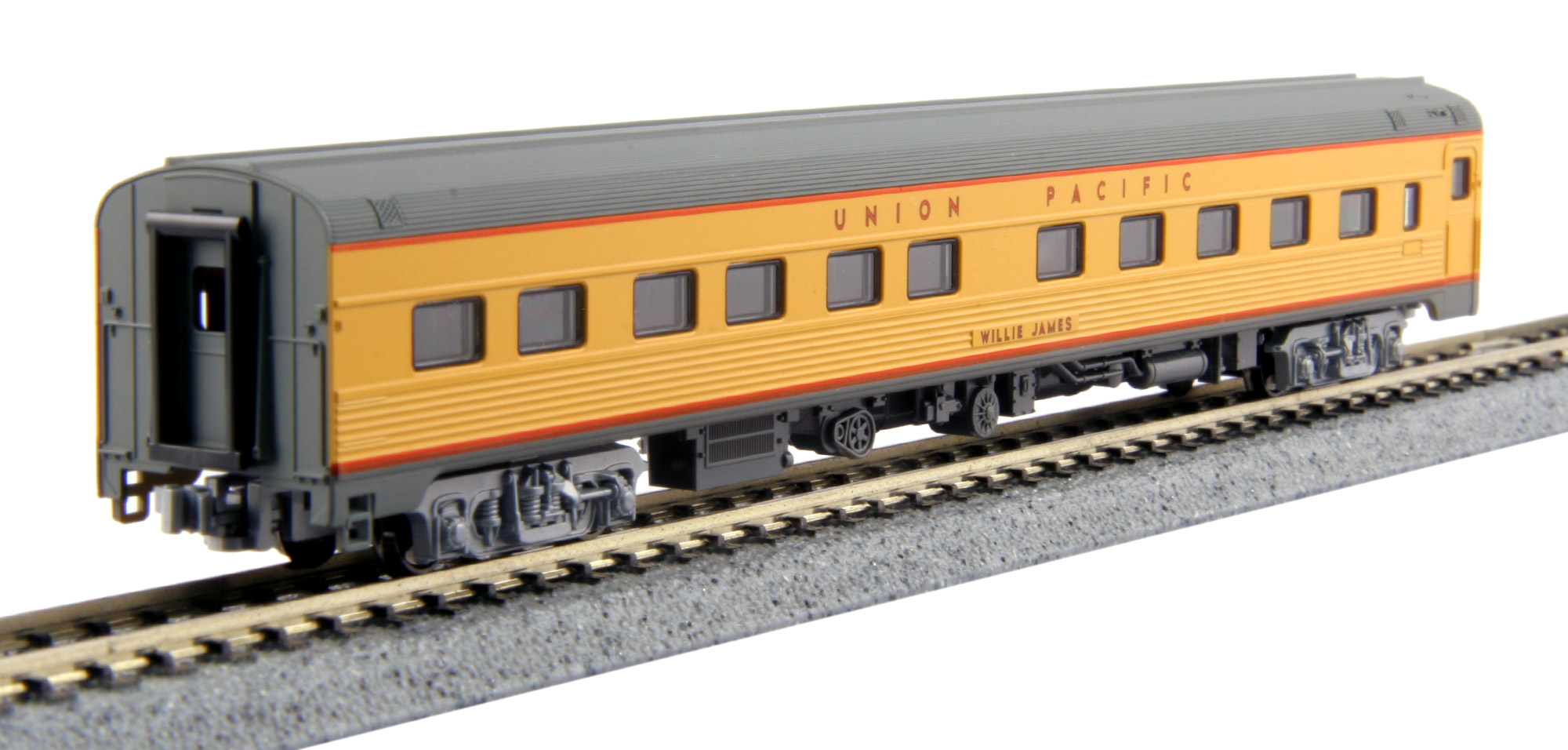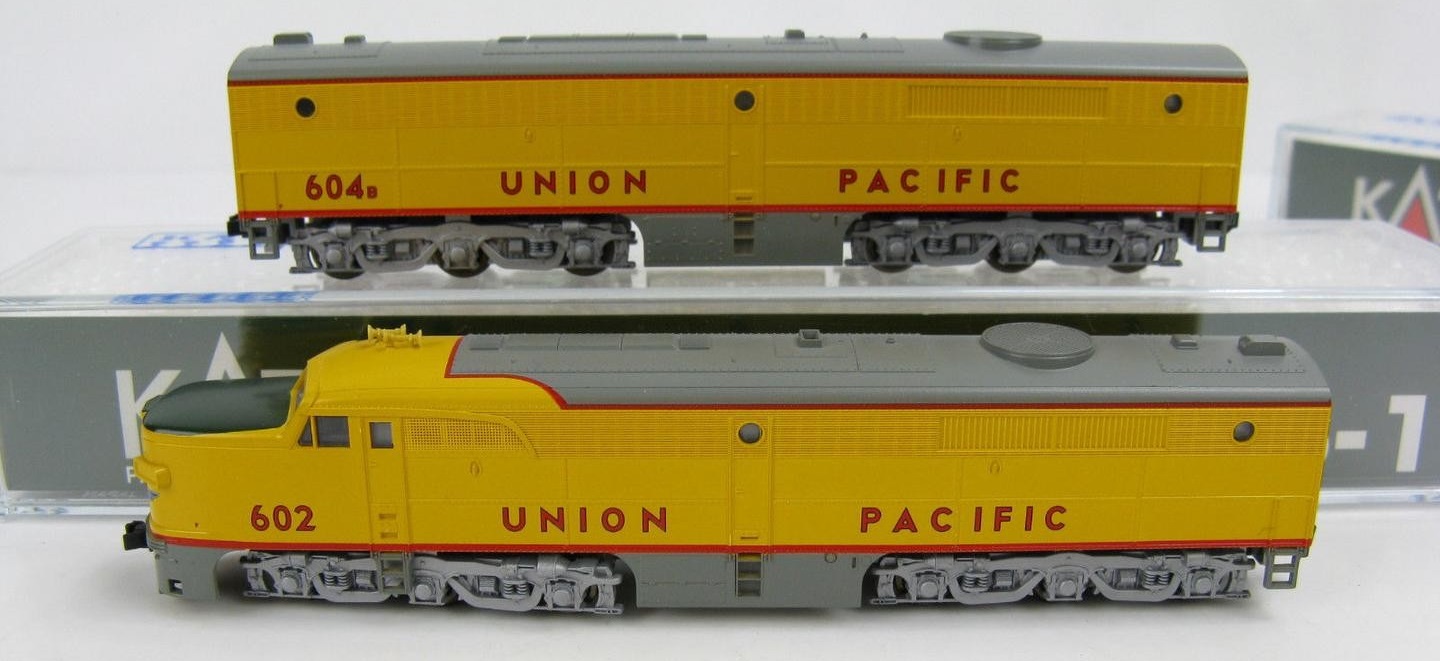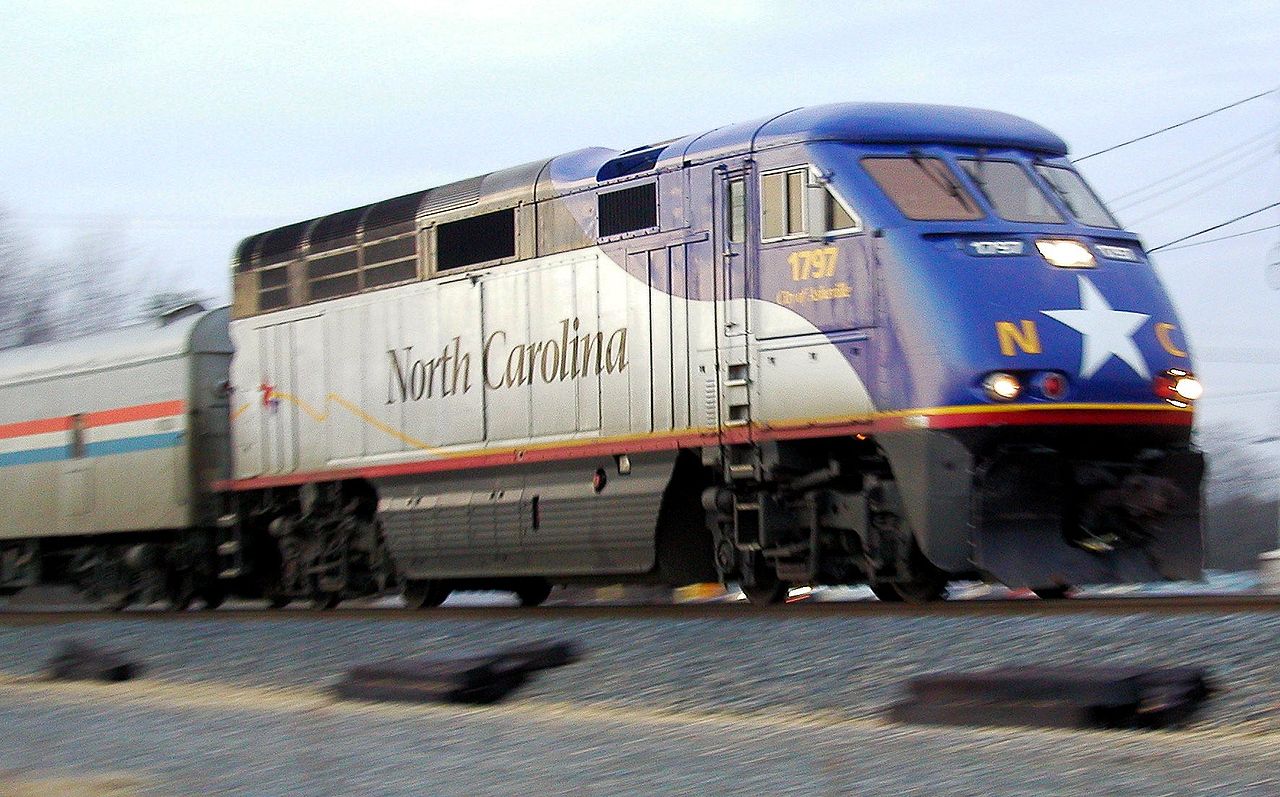Model Information: Kato introduced the MP36PH in 2011. They followed up with the MP40PH-3C in 2014. The Kato N Scale models for the MP36PH and MP40PH-3C share the same internal mechanism. They differ only in the shell details.
This is a standard high-end modern Kato model. The model features a split-frame mechanism with blackened metal low-profile wheels and operating knuckle couplers. It runs smoothly and quietly and looks great.
This is a standard high-end modern Kato model. The model features a split-frame mechanism with blackened metal low-profile wheels and operating knuckle couplers. It runs smoothly and quietly and looks great.
DCC Information: It accepts a drop-in decoder that installs under a weird-looking gray doodad on the chassis. This model accepts the Digitrax DN163K4B decoder.
Prototype History: The EMD F59PHI is a common diesel-electric locomotive on passenger trains in North America, built originally by General Motors Electro-Motive Division (EMD), now built by the successor company, Electro-Motive Diesel, which is owned by Progress Rail Services, itself a division of Caterpillar.
First built in 1994, the locomotive is a 3,200 hp (2.4 MW) B-B diesel-electric locomotive intended for service on North American mainlines. This locomotive is equipped with a turbocharged EMD 12-710G3C-EC, a 12-cylinder, 2 stroke diesel engine (prime mover). The main (traction) alternator converts mechanical energy from the prime mover into electrical energy that is distributed through a high voltage cabinet to direct current traction motors. Each of the four traction motors is directly geared to a pair of driving wheels. The gear ratio of the traction motors (model D87BTR) to wheel axle determines the maximum operating speed of the locomotive; a standard F59PHI has a gear ratio of 56:21 which provides a top speed of 110 miles per hour (180 km/h).
The F59PHI has a fully enclosed carbody which provides protected walkways for easy access to the engine room and trailing units. This arrangement allows routine maintenance while the locomotive is in service. The noteworthy aspect of this locomotive's exterior is the use of composites to present a streamlined appearance.
To supply electrical power for passenger service, the F59PHI is equipped with a secondary electrical generator referred to as the Head End Power (HEP) unit. The head-end generator generates AC power at 480 V, 60 Hz AC, and can be rated between 500 and 750 kW (670 and 1,010 hp) to provide power to the passenger carriages for lighting, electric heating, and air conditioning. The head-end generator is powered by a second diesel engine dedicated to it. With this arrangement, the prime mover is not burdened by head-end power generation and consequently is used solely for supplying tractive effort.
From Wikipedia
First built in 1994, the locomotive is a 3,200 hp (2.4 MW) B-B diesel-electric locomotive intended for service on North American mainlines. This locomotive is equipped with a turbocharged EMD 12-710G3C-EC, a 12-cylinder, 2 stroke diesel engine (prime mover). The main (traction) alternator converts mechanical energy from the prime mover into electrical energy that is distributed through a high voltage cabinet to direct current traction motors. Each of the four traction motors is directly geared to a pair of driving wheels. The gear ratio of the traction motors (model D87BTR) to wheel axle determines the maximum operating speed of the locomotive; a standard F59PHI has a gear ratio of 56:21 which provides a top speed of 110 miles per hour (180 km/h).
The F59PHI has a fully enclosed carbody which provides protected walkways for easy access to the engine room and trailing units. This arrangement allows routine maintenance while the locomotive is in service. The noteworthy aspect of this locomotive's exterior is the use of composites to present a streamlined appearance.
To supply electrical power for passenger service, the F59PHI is equipped with a secondary electrical generator referred to as the Head End Power (HEP) unit. The head-end generator generates AC power at 480 V, 60 Hz AC, and can be rated between 500 and 750 kW (670 and 1,010 hp) to provide power to the passenger carriages for lighting, electric heating, and air conditioning. The head-end generator is powered by a second diesel engine dedicated to it. With this arrangement, the prime mover is not burdened by head-end power generation and consequently is used solely for supplying tractive effort.
From Wikipedia
Road Name History: “K” Line Logistics (U.S.A.) Inc. is an International Freight Forwarding company and also Customs Broker.
Established nearly 50 years ago, "K" Line Logistics, Ltd. (KLL), with headquarters in Japan, operates as an International Freight Forwarder and Passenger Travel Agent within the Kawasaki Group. Currently, KLL boasts over 50 offices employing over 1,800 professionals worldwide.
K" Line - Kawasaki Kisen Kaisha, Ltd. - is the third largest Japanese shipping line. From its beginnings in 1919 to its state-of-the-industry technological advancements of today, "K" Line has been dedicated to serving the shipping community. "K" Line is a worldwide integrated transportation enterprise prepared to address the challenges of an ever changing environment.
Established nearly 50 years ago, "K" Line Logistics, Ltd. (KLL), with headquarters in Japan, operates as an International Freight Forwarder and Passenger Travel Agent within the Kawasaki Group. Currently, KLL boasts over 50 offices employing over 1,800 professionals worldwide.
K" Line - Kawasaki Kisen Kaisha, Ltd. - is the third largest Japanese shipping line. From its beginnings in 1919 to its state-of-the-industry technological advancements of today, "K" Line has been dedicated to serving the shipping community. "K" Line is a worldwide integrated transportation enterprise prepared to address the challenges of an ever changing environment.
Brand/Importer Information: KATO U.S.A. was established in 1986, with the first U.S. locomotive model (the GP38-2, in N-Scale) released in 1987. Since that time, KATO has come to be known as one of the leading manufacturers of precision railroad products for the modeling community. KATO's parent company, Sekisui Kinzoku Co., Ltd., is headquartered in Tokyo, Japan.
In addition to producing ready-to-run HO and N scale models that are universally hailed for their high level of detail, craftsmanship and operation, KATO also manufactures UNITRACK. UNITRACK is the finest rail & roadbed modular track system available to modelers today. With the track and roadbed integrated into a single piece, UNITRACK features a nickel-silver rail and a realistic-looking roadbed. Patented UNIJOINERS allow sections to be snapped together quickly and securely, time after time if necessary.
The Kato U.S.A. office and warehouse facility is located in Schaumburg, Illinois, approximately 30 miles northwest of Chicago. All research & development of new North American products is performed here, in addition to the sales and distribution of merchandise to a vast network of wholesale representatives and retail dealers. Models requiring service sent in by hobbyists are usually attended to at this location as well. The manufacturing of all KATO products is performed in Japan.
Supporters of KATO should note that there is currently no showroom or operating exhibit of models at the Schaumburg facility. Furthermore, model parts are the only merchandise sold directly to consumers. (Please view the Parts Catalog of this website for more specific information.)
In addition to producing ready-to-run HO and N scale models that are universally hailed for their high level of detail, craftsmanship and operation, KATO also manufactures UNITRACK. UNITRACK is the finest rail & roadbed modular track system available to modelers today. With the track and roadbed integrated into a single piece, UNITRACK features a nickel-silver rail and a realistic-looking roadbed. Patented UNIJOINERS allow sections to be snapped together quickly and securely, time after time if necessary.
The Kato U.S.A. office and warehouse facility is located in Schaumburg, Illinois, approximately 30 miles northwest of Chicago. All research & development of new North American products is performed here, in addition to the sales and distribution of merchandise to a vast network of wholesale representatives and retail dealers. Models requiring service sent in by hobbyists are usually attended to at this location as well. The manufacturing of all KATO products is performed in Japan.
Supporters of KATO should note that there is currently no showroom or operating exhibit of models at the Schaumburg facility. Furthermore, model parts are the only merchandise sold directly to consumers. (Please view the Parts Catalog of this website for more specific information.)
Item created by: Powderman on 2021-12-26 14:06:44. Last edited by Powderman on 2021-12-26 14:09:15
If you see errors or missing data in this entry, please feel free to log in and edit it. Anyone with a Gmail account can log in instantly.
If you see errors or missing data in this entry, please feel free to log in and edit it. Anyone with a Gmail account can log in instantly.


